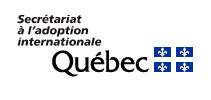Rights of the Child
“[…] to ensure that intercountry adoptions take place in the best interests of the child and with respect for his or her fundamental rights as recognized in international law.”
The rights of the child, recognized globally, are based on various reference texts.
The commitment of countries to protect the rights and the best interests of the child at all times is at the heart of the adoption process. Children who are capable of forming their own views must be allowed to express them freely, particularly when a decision is about to be taken in their respect.
According to the 1989 United Nations Convention on the Rights of the Child, in force in Canada since 1992
A child has the right to
- bear a name
- acquire a nationality
- be consulted and be legally represented
- be respected
- have food and shelter adapted to his or her needs
- have access to health care and social services
- receive an education
- engage in play and recreational activities
- be protected
According to the Convention on Protection of Children and Co-operation in Respect of Intercountry Adoption, in effect in Québec since 2006
A child has the right to
- grow up in a family environment;
- grow up in an atmosphere of happiness, love and understanding;
- remain in the care of his or her family of origin;
- know his or her origins.
If an international adoption is considered, it must be in the best interests of the child and with respect for his or her rights.
Children have the right to expect that measures will be taken to prevent their abduction, sale, or traffic in any shape or form.
According to the Canadian Charter of Rights and Freedoms, the Charter of Human Rights and Freedoms, the Civil Code of Québec and the Youth Protection Act
A child has the right to
- have parents who care for him or her,
- be protected and safe,
- receive attention,
- be informed,
- be heard and consulted,
- know his or her origins.
